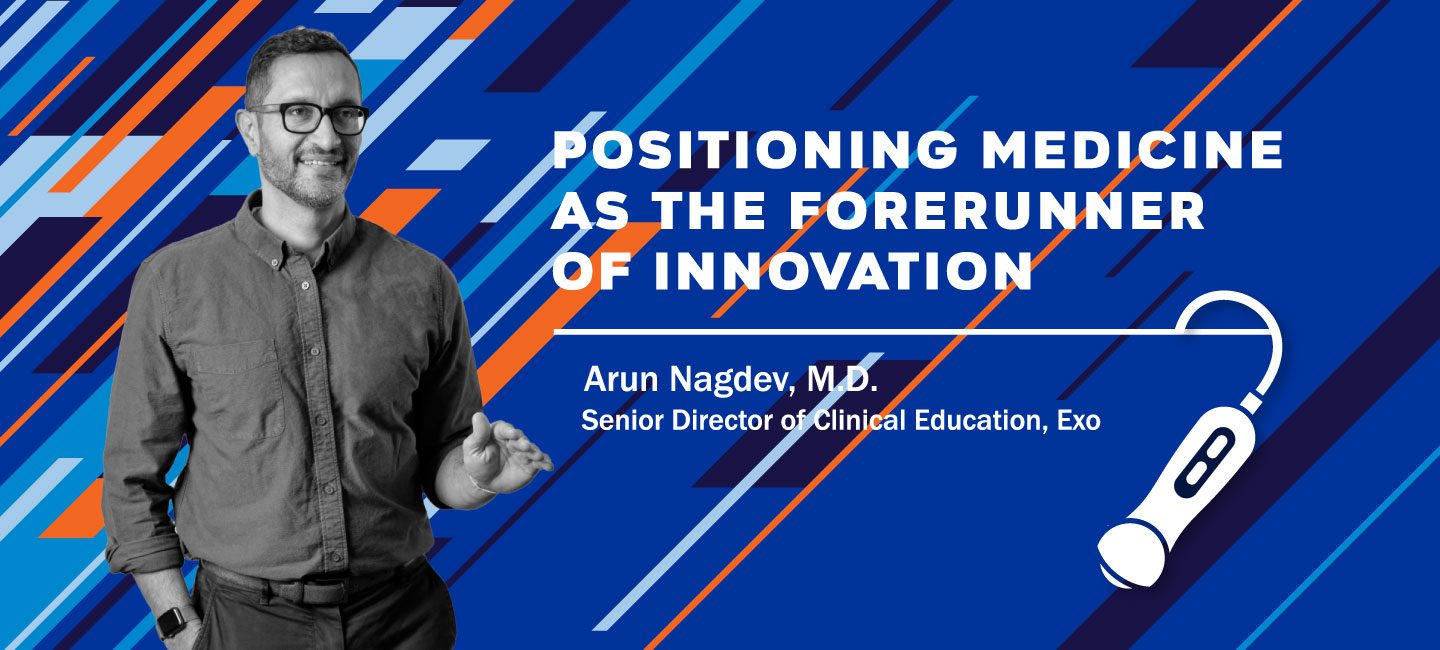Innovation has been a buzzword that has saturated industries for decades. There’s no doubt that the growth and depth of technology have influenced the strength and value associated with the word. We entered into the new millennium, and it became clear that what would be notable with the passing of time is how much innovation would change our norm. Quickly, what existed and defined how we do things, would be made obsolete before we had the opportunity to adjust.
Most sectors have thrived from the progression of the creative and inventive culture dictating our world today. Cell phone manufacturers are constantly reconceptualizing communications and pushing connecting to the forefront. Fashion has taken note of social trends and embedded them into expressible wardrobe layers. Consumption and creation of content continue to reimagine media. However, slow to the races appear to be medicine.

Dr. Arun Nagdev, Exo Senior Director of Clinical Education and Director, Emergency Ultrasound at Alameda Health System, stops by the FOCUS on POCUS™ podcast to discuss the traditionally slow movement of the field. He shares his excitement, particularly for the current rapid growth and visually seen impact of point-of-care ultrasound (POCUS) within the medical community. Dr. Nagdev attributes the shift in POCUS healthcare to innovation. The forever evolving disruption that technology delivers has provided ultrasound images that Dr. Nagdev describes as “clean and novel.”
POCUS made significant waves during the COVID-19 pandemic by helping medical providers manage and treat the virus in ways other modalities could not. It quickly became the go-to sidekick of many frontline workers and a healthcare phenomenon. However, POCUS has been on the scene for quite some time. The pocket-sized device has been integrated into diverse areas of clinical practice, beginning in the early ’90s. Since its arrival, there has been resistance among providers causing a rift in medicine.
Dr. Nagdev admits to being amidst the collective that opposed innovation. “I was that old guy who was intolerant to medical change,” he describes. Today, he teaches 10 residents annually on POCUS usage and has been doing so for over 15 years. He also uses the modality on almost every patient under his care. Dr. Nagdev is now an advocate for outside-of-the-box thinking in medicine after experiencing the impacts that embracing evolution brings to his patients and to healthcare.
This transformation of mind began for Dr. Nagdev during his fellowship at Highland Emergency Medicine (EM) Residency Program. It was there he encountered some of the greatest thinkers in EM. Daily, Dr. Nagdev witnessed and was surrounded by residents who pressed the medical envelope and visionaries who would stretch the limits of what could be done. “They were just doing what medicine should do regularly—challenge the norm,” Dr. Nagdev explains.
To innovate is to solve difficulties and provide solutions before issues arise and problems are identified. More often than not, healthcare is scrambling for answers after the question has been posed instead of proactively producing the resolutions required. The opioid epidemic is an example presented by Dr. Nagdev in this thought-provoking episode. A drug used substantially by providers to reduce or eliminate a patient’s pain is now a massive issue plaguing the public. With this challenge mounting, the medical community is ready and willing to embrace the education and training necessary to implement ultrasound guidance for nerve blocks. POCUS has been readily available to assist in this pain reduction procedure, but the acceptance and application only appeared when the circumstance told us we had no other choice.
Medicine shouldn’t wait to be told to innovate. Instead, this is one field that should be leading the charge. The more we redefine the standards and set them high, the more lives are saved, and care is amplified. In medicine, only the sky should be the limit. Dr. Nagdev reminds us, “The only limitation on medicine’s progress is the physicians who prevent other people from doing good things.”
Listen to his complete discussion on the FOCUS on POCUS podcast.




















